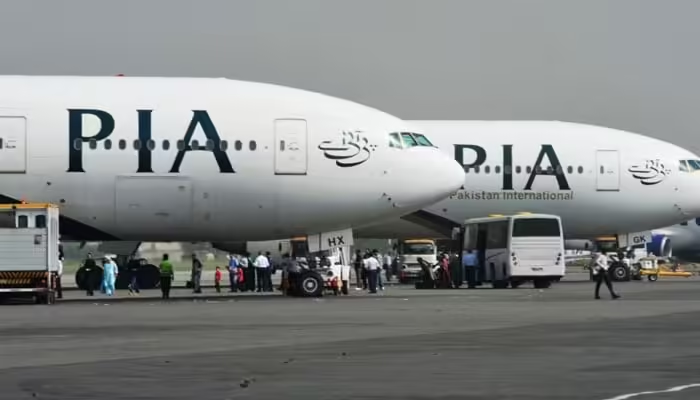Pakistan International Airlines (PIA) has announced the cancellation and delay of several flights, affecting both domestic and international passengers. Operational issues have caused these disruptions, leaving many travelers stranded or facing significant delays. This news highlights the ongoing operational challenges faced by PIA and the widespread inconvenience caused to passengers traveling to popular international destinations such as Riyadh, Dubai, and Jeddah.
Cancellations Impacting Lahore to Riyadh Flights
PIA’s flight services from Lahore to Riyadh, a route used by many travelers heading to Saudi Arabia, have been severely impacted. Flights PK 725 and PK 726, scheduled to operate between Lahore and Riyadh, have been canceled. PIA has cited operational reasons as the cause of these cancellations, though further details were not immediately provided. Passengers booked on these flights were notified, and the airline has offered alternatives to mitigate their inconvenience, though specific arrangements were not disclosed.
The cancellation of flights between Lahore and Riyadh is a considerable setback, especially for travelers visiting Saudi Arabia for business, work, or religious purposes. The route is typically in high demand, as it connects Pakistan with Saudi Arabia’s capital, Riyadh, a major hub for trade and religious activities.
Delays for Flights from Istanbul to Karachi
In addition to the cancellations, PIA has also announced delays affecting flights coming from Istanbul to Karachi. Passengers on these flights faced delays of approximately one and a half hours, causing a ripple effect on their travel plans, especially for those with connecting flights from Karachi to other cities. The delays have underscored the operational challenges that airlines can face, particularly on busy international routes.
Widespread Disruptions for Foreign Flights
Overall, PIA has had to cancel six foreign flights due to ongoing operational challenges. Among these, PIA’s PK 213 flight, scheduled to travel from Karachi to Dubai, was delayed by over two hours. Dubai, being a major destination for Pakistani travelers, is another crucial route where disruptions can affect a high number of passengers.
Flights between Lahore, Jeddah, and Dubai have also been affected, with both arrivals and departures facing delays of over an hour. These delays may be a result of the same operational constraints that have led to the cancellation of other flights, though PIA has not clarified specific reasons.
The Consequences of Cancellations and Delays
Flight cancellations and delays can have significant consequences for passengers, especially those traveling internationally. Some of the immediate impacts include:
- Disruption to Work and Personal Plans: Many passengers traveling to Saudi Arabia, Dubai, or Jeddah rely on these flights for work commitments, especially Pakistani expatriates working in the Middle East. Delays can lead to missed workdays and may even affect job security for some individuals.
- Inconvenience for Pilgrims: Many passengers on flights to Saudi Arabia may be heading there for religious reasons, such as Umrah. For these travelers, any change in their travel plans can be particularly distressing, as they may have made extensive arrangements and time-sensitive bookings around their pilgrimage.
- Financial Implications: Delays and cancellations often result in additional costs for passengers, whether for rebooking flights, arranging temporary accommodations, or managing missed connections. Such unanticipated expenses add to the stress and frustration for travelers.
PIA’s Operational Challenges
PIA has faced a range of operational and financial challenges in recent years, which have impacted the consistency of its services. Operational disruptions can be attributed to factors such as:
- Fleet Management Issues: Maintaining a consistent and reliable fleet is essential for any airline. Delays and cancellations can sometimes stem from maintenance issues or aircraft shortages, a challenge that PIA has faced on multiple occasions.
- Financial Constraints: Financial challenges can lead to reduced staffing, less frequent maintenance, or operational adjustments that affect flight schedules. PIA has struggled financially in recent years, and this could be impacting its ability to operate efficiently.
- Resource Allocation: Operating flights across multiple international destinations requires careful resource allocation. Delays in one area, like Istanbul or Karachi, can ripple across the network, leading to subsequent delays or cancellations on other routes.
The Road to Recovery
In response to these disruptions, PIA may need to address the root causes of these operational issues to restore confidence among travelers. Some measures that PIA could consider include:
- Improving Fleet Maintenance: Ensuring that aircraft are properly maintained and available for scheduled flights could reduce delays and cancellations, allowing for smoother and more consistent operations.
- Enhancing Communication with Passengers: Effective communication can greatly improve passenger experiences. By keeping passengers informed about delays and cancellations in real-time, PIA can help travelers make necessary adjustments and reduce inconvenience.
- Investing in Operational Efficiency: Investing in operational improvements, such as optimized scheduling and resource allocation, can help PIA prevent such widespread disruptions and provide more reliable service.
Conclusion: Prioritizing Passenger Needs
The recent cancellations and delays highlight the need for PIA to prioritize operational efficiency and improve the reliability of its services. As a national carrier, PIA plays a critical role in connecting Pakistan with other parts of the world, especially the Middle East, where many Pakistani expatriates reside.
For travelers impacted by these delays and cancellations, patience and flexibility are key, though the inconvenience caused is understandably frustrating. Moving forward, passengers hope that PIA will take proactive steps to address these operational issues and ensure a more seamless travel experience on its international routes.



